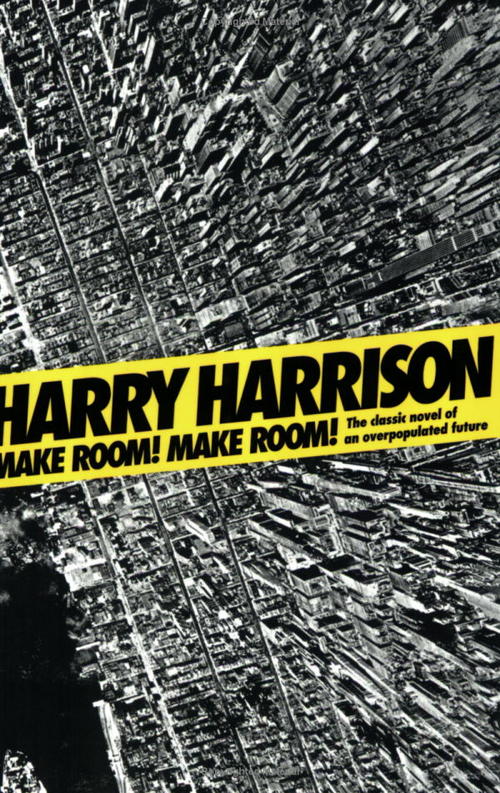Hello everyone and happy Thanksgiving! That is, if you live in the United States anyway. If you're Canadian and reading this, happy Thanksgiving like six weeks ago. Anyway, in celebration of a significant number of us having enough food to gorge ourselves sick I'm reviewing Make Room! Make Room! by Harry Harrison. If you're not a classic science-fiction fan you might not have heard of this book, but there's a pretty good chance you've heard of the film adaptation of this book, Soylent Green. And for those of you who have not even heard of Soylent Green through pop culture osmosis, let me just make the obligatory reference right now. SOYLENT GREEN IS PEOPLE!
Okay, to put that into context, both the movie and the book deal with an overpopulated future where humanity has reached a whopping total of seven billion. (A number we actually reached in 2011.) Due to pollution and squandering of natural resources humanity is shoved into increasingly smaller places leading to a great amount of overcrowding and New York City alone has a population of over 35 million people. Food is hard to come by, most people survive on products made out of soybeans and lentils (hence the name soylent) if they're lucky. If they aren't then they're surviving off of various foodstuffs made out of plankton and seaweed. Soylent green is the final, logical step in which people are turned into food, creating a self-sustaining cycle. Interestingly enough the soylent green so famous in the movie actually doesn't show up in the book, making it an original creation of the movie. I kept expecting it to show up in the book, but was surprised when it never did, which was very interesting for me.
Harrison does a very good job of depicting the decay and desolation of an overpopulated world. His descriptions of the decay, the filth, and the utter desperation definitely gives you a feeling of how bad the world has gotten. The description of Sol's improvements to his home stove, adapting it as more and more types of fuel become unavailable really drives home the desperation and sense of hopelessness. I was reminded greatly of the novel The Beautyful Ones Are Not Yet Born, a book written by a Ghanian author dealing with the rampant corruption and decay of Ghana (and many other African nations) in the 1960's. (Incidentally I highly recommend checking that book out to get a really interesting look inside life in Africa in the 1960's.) Anyway, Harrison really makes you feel and understand how bad the world can get when basic necessities like food and water become difficult for people to obtain.
The whole purpose of this atmosphere of desperation is to eventually let Harrison make an author tract through the character of Sol in support of birth control. Which, aside from contraceptive methods like the pill or condoms, would include the option of abortion as well. Today the book looks rather antiquated because we freely talk about birth control and it's actually been an issue as to whether or not employers should be required to provide it through health insurance to their employees. The fact that we can actually talk about this subject shows how much progress we've made in the last fifty years. Although there had been some progress made starting from the late 1870's, by the 1960's it was still almost taboo to even talk about birth control, much less make a decision about it. The fact that we can, in theory, talk about it like rational adults means that a ton of progress has been made. (Thanks, second-wave feminism!)
Ultimately Harrison is making a strong argument that we need to have access to methods of birth control because if we let human population continue to grow exponentially then there will be serious consequences, something which I've seen in other stories such as The Caves of Steel by Isaac Asimov. Most specifically, food supplies not growing to meet the demands of the population, a realistic concern in the 1950's and 1960's as expansion of health care across the globe helped decrease infant mortality and we also began seeing longer life expectancy for people as well. Fortunately we had the Green Revolution which significantly increased crop yields across the world and meant things haven't fallen apart. Yet.
Despite declining birth rates in industrialized countries like the United States, we are still facing a growing population, especially in places like South America, Africa, and Asia. Scientists are fortunately already working to bring about the next Green Revolution to try and make food supplies meet demands, but there is concern that their work will not be enough. Whether they will be successful or not remains to be seen.
Overall Harrison's work is an interesting look into the fears and concerns of the 1960's, but it definitely feels outdated by modern standards. The concern of population outstripping food supplies is a very real problem for the twenty-first century, but the availability of birth control makes Harrison's arguments unfortunately outdated. The book ends with a overall sense of desperation which makes you feel like if nothing is done now, the future could very easily end up like it is in the book. Certainly we have different challenges to face in 2015, but we still need to take action now if the future is to be liveable for all of us.
- Kalpar


No comments:
Post a Comment